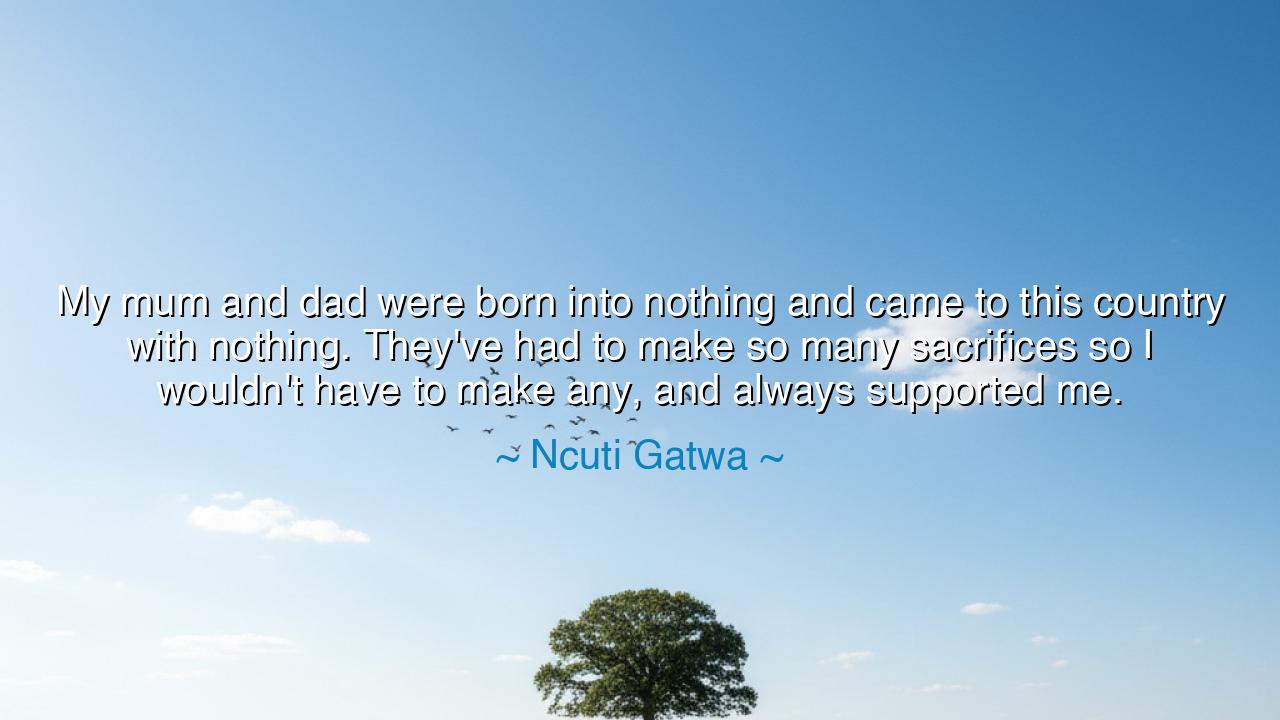
My mum and dad were born into nothing and came to this country
My mum and dad were born into nothing and came to this country with nothing. They've had to make so many sacrifices so I wouldn't have to make any, and always supported me.






“My mum and dad were born into nothing and came to this country with nothing. They've had to make so many sacrifices so I wouldn't have to make any, and always supported me.” — Ncuti Gatwa
Thus spoke Ncuti Gatwa, the son of dreamers, the heir of endurance — words born not from pride, but from gratitude. In these lines, he lifts a veil upon one of the oldest and noblest truths in the human story: that greatness rarely begins with comfort, but with sacrifice, and that the brightest lives are often lit by the quiet fires of parental love. His words are not a boast, but a hymn — an ode to those who build not for themselves, but for their children. Through him, we hear the eternal song of migration, of hope, and of love made manifest through hardship.
The origin of this quote lies in the journey of Gatwa’s parents — Rwandan by birth, refugees by circumstance, who fled the terrors of war to seek peace upon foreign soil. They arrived, as he says, “with nothing,” yet carried within them something greater than possessions — the will to endure. Like countless others throughout history, they became part of the sacred lineage of those who leave the known behind for the promise of a better tomorrow. Their sacrifices were not made for recognition, but for their child, who would one day stand free in the light they never had. It is this unspoken covenant — between generations past and those yet to come — that Gatwa honors in his words.
To sacrifice is to give up comfort for the sake of something greater. This is the divine act of love repeated through all time. Consider the Pilgrims who left their homes to cross stormy seas, or the mothers and fathers of every age who worked long hours in fields, in factories, in silence, that their children might read books and dream freely. These are not tales of kings or warriors, but of the true heroes of civilization — those who build the foundations upon which others may rise. Gatwa’s parents, like so many before them, lived the truth that love is measured not in what one gains, but in what one gives away.
There is a profound humility in Gatwa’s reflection. He does not claim his success as his own, but as the flowering of roots his parents planted in hardship. In their struggle, he finds not shame, but honor. And this, too, is wisdom. For the child who remembers the sacrifices that raised him walks through life with balance and reverence. He does not take ease for granted; he sees behind every opportunity the unseen labor of others. This recognition — that one’s achievements rest upon the unseen love of those who came before — is the beginning of true greatness.
History itself is filled with such echoes. Think of Andrew Carnegie, born into poverty in Scotland, whose parents emigrated to America in search of a better life. His mother worked tirelessly, taking in sewing and washing, so her son could read and learn. In time, Carnegie became one of the most influential philanthropists in the world — yet he never forgot his mother’s hands, worn by labor. So it is with Gatwa: the success the world sees — his artistry, his fame, his rising star — is not merely his alone. It is the continuation of a legacy, the reward of generations who dared to hope beyond their means.
Let this, then, be the lesson: remember the soil from which you have grown. No man is self-made — we are all the sum of unseen sacrifices, of silent prayers, of the courage of those who came before us. To forget this is to lose one’s roots; to remember it is to gain wisdom. If your life is built upon the labor of others, honor them by living with purpose and gratitude. Let their endurance make you humble, and their love make you strong.
And so, my child of the future, carry this truth within you: your comforts were bought with someone else’s courage. The roof above you, the path before you, the dreams you now chase — all were paid for by hearts that bore hardship so that you might not have to. Cherish their sacrifice, and in your own time, be willing to do the same. For the chain of progress is unbroken only when love gives birth to love again — when the child who was lifted by others grows strong enough to lift another. In this way, as Ncuti Gatwa’s words remind us, we honor not only our parents, but the very spirit of humanity itself.






AAdministratorAdministrator
Welcome, honored guests. Please leave a comment, we will respond soon